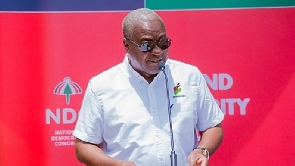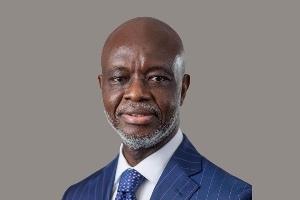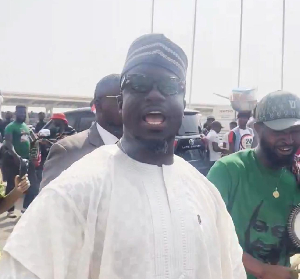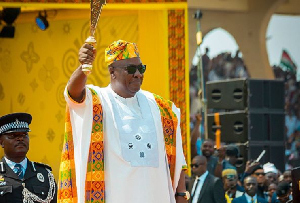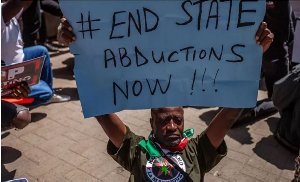Many businesses still bear the brunt of the economic meltdown "because contrary to the Finance Minister’s assertion, we have not turned any corner, and 2024 will be a very challenging year, former President John Mahama has said.
Speaking at the 9th Ghana CEO Network Business Cocktail on Thursday, 7 December 2023, Mr. Mahama said: "Many have shut down their businesses, and hundreds of thousands of laid-off workers are still at home".
He said businesses that "moved headquarters from Ghana to our neighbouring countries have yet to return".
Also, he noted that the "poorly thought-through banking sector clean-up has left thousands of skilled financial sector workers, jobless and impoverished.
When he presented the 2024 budget to Parliament on 15 November 2023, Mr Ofori-Atta said the social investments of the Akufo-Addo government has had a positive impact on every Ghanaian household and insisted that the Ghanaian economy had shaken off the turbulence of the previous years.
He said "We have worked hard and invested significant resources" and "being sure of this knowledge, I can confidently assert that over the past 7 years, every sector has been positively impacted. Every household has been positively impacted by our social intervention programmes. And Every region has also been positively impacted."
"Indeed, President Akufo-Addo has deepened decentralised development by investing GH¢422.1 million to create and resource six new administrative regions. The most in our history since independence," he asserted.
"Consistent with our policy on preferential options for the poor, i.e. leaving no one behind, we have been historic in enhancing social mobility and protected the vulnerable in our society. In this regard, we have since 2017:
i. Improved access to quality SHS education for about 5.7 million Ghanaians by investing GH¢8.4 billion in the future of our next generation;
ii. Increased enrolment and learning outcomes of 3.8 million pupils by investing GH¢3.6 billion in the School Feeding Programmes;
iii. Reformed the NHIS to improve and expand health service delivery to 16 million Ghanaians.
iv. Supported foundational education of over 6 million pupils by investing GH¢248.5 million as Capitation Grants; and
v. Improved the quality of life of about 350,000 Ghanaian households under the LEAP by investing GH¢1.2 billion".
Additionally, Mr Ofori-Atta said the government "made all these investments into social mobility, not just because it was the right thing to do morally, but also because we believe it is economically essential to uplift and extend opportunities to every Ghanaian household. We are confident that the record-high investments we have made and continue to make over these seven years in preparing our children for a brighter future will significantly transform our society, especially by tackling the root cause of poverty that has afflicted many families from generation to generation".
He said, "Having a child pursuing a university degree is no more a purview for the rich but for all strata of our society."
"We believe it has been seven years of grace and positive impact. We are determined to do more to boost the capacity of the private sector to expand productivity and create jobs. In the past 7 years, we have:
i. Invested GH¢32.7 billion to keep the lights on and support the growth of businesses;
ii. Invested GH¢25.3 billion to facilitate the repositioning of the financial sector and enhance its ability to assist business operations. To date, the Development Bank Ghana has facilitated GH¢1 billion in competitive financing for the private sector, and GIRSAL continues to mitigate risks in the agriculture sector;
iii. Supported 100,000 young graduates to secure workplace experience and employment by investing GH¢2.4 billion in NABCO;
iv. Invested GH¢7.1 billion to build road and transport infrastructure to improve connectivity and productivity;
v. Invested GH¢541.5 million in 169 1D1F enterprises to scale-up value-addition and provided 140,000 additional jobs; and
vi. Created over 2.3 million jobs in the private and public sectors (approximately 900,000 in the private sector and 1.4 million in the public sector)".
He said "Capital spending is equally important to the future of our country, consequently we mobilised and deployed resources to:
i. Expand the railway network, including connecting Tema to Mpakadan to promote trade on the Eastern Corridor;
ii. Construct 12 fish landing sites and two (2) fishing harbours at a cost of GH¢19.5 million to promote the fishery-based livelihoods of our coastal folks;
iii. Improve community infrastructure by investing GH¢2.2 billion into over 2,000 projects under the IPEP initiative;
iv. Promote inner city development by spending GH¢190.3 million under the Zongo Development Fund; and
v. Expanded and improved the road network by investing about GH¢16 billion. Recording the most kilometers of roads and interchanges done in our history".
"Mr. Speaker, we also invested GH¢1.7 billion in the National Identification Scheme to ensure that 17.5 million eligible Ghanaians acquire security-sensitive ID Cards. This has laid the foundation for a prosperous future where digitalisation provides more convenience, introduces an added layer of efficiency in delivering public services, and enhances our ability to safeguard our national interests".
He reiterated: "I want to stress at this juncture that Ghana has paid its dues, has turned the corner, and getting back on track".
"Despite these successes, we have to do more to reinforce our stability and guarantee decent jobs with good pay for the young people. As such, through the 2024 Budget, we will deliver even more investment across the real sector to place our economy on a firm growth trajectory that will create more jobs, safeguard our climate prospects, and deeply entrench Ghana as the seed country for Africa’s development renaissance," Mr Ofori-Atta said.
Business News of Friday, 8 December 2023
Source: classfmonline.com





